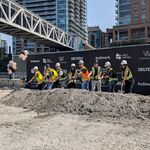We're not talking about townhouses, we're comparing houses and condos. I don't know where you can find a 300k house in Toronto, but if one exists I don't think anyone would want to live there. If we're just talking about the cost of ownership between the average house and the average condo, the maintenance fees will be higher for the condo, the property tax will be higher for the house, and in the end it evens out. Of course the average house costs more than the average condo so the mortgage payments will be higher, which means higher interest payments. The house will also have a higher hydro bill.
In my mind, money spent is money spent. It doesn't matter if it's money spent on maintenance, property tax, mortgage interest or hydro, it's money that essentially goes down the drain. Taking all payments into consideration, it costs more to own an average house over an average condo on a yearly basis. It's not fair to compare a 5 million dollar house with a 300k condo, and it's not fair to compare a 2 million dollar condo with a 500k house, nor is it fair to compare a 300k house (if one exists in Toronto) with a 300k condo in Toronto since the house is well below what the average person has, and that 300k condo is the average condo. I do think it's fair to compare a 300k condo with a 500k house since those are the average prices. In these discussions if you don't talk about the average house and the average condo it's not really a fair comparison. A 300k house in this city is very rare, a 300k condo in this city is average and common, how is it fair to compare them?
1. Townhouses can be either freehold or condos, and are a consideration for many people, so they are definintely part of the discussion. Hell, you can even get detached house type condos (although they're extremely rare in cities like Toronto). Often the reason people don't buy detached homes and live in townhouses is because they can't afford a bigger detached home in the location they want. That's often the exact same reason others may live in condos.
2. $300000 townhouses are extremely common in Toronto, and yes, they are often very nice. That's why I mentioned them in the first place. In fact, my condo downtown was a 2-bedroom 1000+ square foot townhouse. Now it would go for well over $400000, but that's right smack downtown (east of Bathurst and north of Front). If you move out of downtown, it's quite easy to find a nice townhouse for closer to $300000. Not necessarily a 3-bedroom 4-person family-friendly townhouse, but a townhouse nonetheless. Some are condos, and some are freehold. For the former, you pay condo fees, and for the latter you deal with the maintenance yourself. Property taxes for both would be similar, depending on price.
3. $600000 semis and detached homes are very common in Toronto. $600000 condos are also relatively common downtown. If you've got $600000 to spend, it's moronic to say the property taxes will be cheaper in a condo because many condos are $300000. Like I said, that just makes no sense whatsoever. Property taxes are based on home value.
BTW, my sister actually pays more in property taxes in a condo than I do in a detached home. However, that's because she lives in a 1800 square foot waterfront condo, and my house (which is significantly bigger) was underassessed by the city for a long time. I live in a nice neighbourhood, and it's one of the nicer homes in the neighbourhood, but it's not downtown obviously, nor is it Forest Hill. Unfortunately for me, the city is catching up on its assessments, and my property taxes will be going up soon.
Oh and why did she pay big bux for a 1800 square foot condo downtown? Because she could. She wasn't going to move into a $300000 shoebox condo just because a lot of other people are in $300000 shoebox condos.




